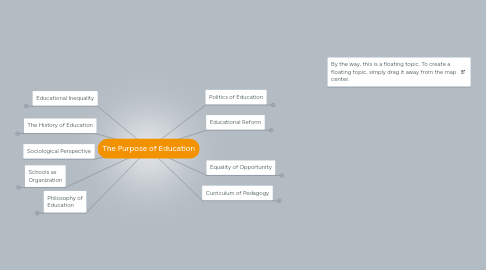
1. The History of Education
1.1. Old Deluder Law
1.2. Committee of Ten
1.3. John Dewey
1.4. First BOE created in Mass. in 1837
1.5. G.I. Bill
1.5.1. Paid for house, schooling, etc
1.6. Plessy v. Furguson of 1896
1.7. Civil Rights Act of 1963
1.8. Space Race
1.9. Elementary/Secondary Ed Act of 1965 provided for special needs students
1.10. Reforms of the Standard Era
1.10.1. N.A.R-Regan
1.10.2. Goals 2000 Clinton
1.10.3. NCLB Bush
1.10.4. RTT Obama
1.11. F.A.P.E
1.11.1. Free and public education
1.12. Democratic School
1.13. Radical Revisionist School
1.13.1. Wants to meet needs of society
1.14. Conservative School
1.14.1. Only the smart elite move on
2. Philosophy of Education
2.1. Teacher based
2.2. Student
2.3. Essentialism
2.3.1. Teacher Centered
2.3.2. Admin controlled
2.3.3. Academically mastered
2.4. Idealism
2.4.1. Lecture on knowledge
2.5. Realism
2.6. Progressiveness
2.6.1. Based on needs of students
3. Sociological Perspective
4. Schools as Organization
4.1. Determinism
4.2. Moral Values
4.3. Interdependance
4.4. Structural Inequality
4.5. School of choice=Success
4.6. Social class=Educational success
4.7. Constitution does not provide for Edu.
4.8. U.S. School system is only program decentralized nationally.
4.8.1. very open to all
4.9. In other countries, individuals are separated by what they can and cannot.
4.10. American students are compared to the elite of other countries.
4.11. France
4.11.1. Very Elite
4.11.2. Government controlled
4.12. School Processes and Cultures
4.12.1. Schools are separate social organizations.
4.12.1.1. They have political structures
4.12.2. Prevailed by the "we feeling"
4.12.2.1. Teacher in conflict with student
4.12.3. Admin and teachers are in conflict
4.12.4. Communities are in conflict with admin
4.13. Reality is hard to ignore
5. Educational Inequality
5.1. Functionalist-hard work equals success
5.2. conflict theorists- students success is affected by their environment.
5.3. Integrationists- success determined by family, social class, and environment,
5.4. Do schools reproduce inequality
5.4.1. Answer:
6. By the way, this is a floating topic. To create a floating topic, simply drag it away from the map center.
7. Politics of Education
7.1. Conservative
7.2. Traditional
7.3. Individuals control success
7.4. Capitalism is the root of Ed. problems
7.5. Social disorder is a problem in Ed.
7.6. Gov. should provided limited help.
8. Curriculum of Pedagogy
8.1. What is taught and how do we teach it?
8.2. Social Meliorists-reform society through social reconstruction.
8.3. Should business effect curriculum
8.4. Should religion effect curriculum
8.5. curriculum
8.5.1. Formal
8.5.1.1. Cognitive taught
8.5.2. Informal
8.5.2.1. taught but no obvious sight
8.5.3. Null
8.5.3.1. not taught but learned
8.6. social order determines curriculum
9. Equality of Opportunity
9.1. social stratification is a structural characteristic of society.
9.2. Caste=a persons social level is determined by family value and worth.
9.3. Class system- a persons worth is determined by their ability to overcome by personal achievement.
9.4. Schools represent the middle and upper class.
9.5. Race has a direct impact on how much educational attainment a person achieves.
9.6. Title 9=equal opportunity in athletics
9.7. PL-Public Law-94-142 or the EHA -law that created special edu.
9.8. REI-Regular Educational Initiative
9.9. IDEA-1996
9.10. The Coleman Study of 1996
9.10.1. Says school organization differences does not contribute to student outcomes as much as student body. Private schools outperform public school students.
9.11. Minorities do better in integrated school.
10. Educational Reform
10.1. How do we improve schools?
10.2. Teacher is the single most important factor of a students success.
10.3. Characteristics: A "Calling" for the profession.
10.3.1. Professional Knowledge
10.3.2. Street smart
10.3.3. Good Communicator
10.3.4. With-it-ness
10.3.5. Lifelong learner
10.4. Reform in Edu. in 1980's to 2012.
10.5. John Goodlad "A Place Called School"
10.6. Federal involvement
10.6.1. America Involvement 2000
10.6.2. Goals 2000
10.6.3. No child left behind act
10.6.4. Race to the top
10.7. Approaches to Reform
10.7.1. Neo Liberal Approach
10.7.2. Societal and Community Approach
10.8. School based reforms
10.8.1. School Choice
10.8.2. Charter Schools
10.8.3. Tuition Vouchers
10.8.4. Public or Private
10.9. School Improvement
10.10. More intellectual demands in Edu.
10.10.1. Attract and retain competent teachers
